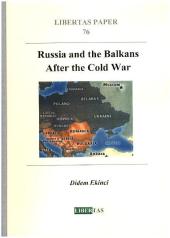 Neuerscheinungen 2013Stand: 2020-01-07 |
Schnellsuche
ISBN/Stichwort/Autor
|
Herderstraße 10
10625 Berlin
Tel.: 030 315 714 16
Fax 030 315 714 14
info@buchspektrum.de |

Didem Ekinci
Russia and the Balkans After the Cold War
2013. 110 S. 2. 21 cm
Verlag/Jahr: LIBERTAS-EUROPÄISCHES INSTITUT 2013
ISBN: 3-937642-40-4 (3937642404)
Neue ISBN: 978-3-937642-40-6 (9783937642406)
Preis und Lieferzeit: Bitte klicken
The Publication
This book focuses on the post-Cold War evolution of Russia´s Balkan policies, upon a brief historical background. Shaped by liberal, nationalist/Communist and pragmatist approaches in domestic and foreign policy-making, Russia´s overall Balkan policy was marked by emphasis on its great power status, emphasis on the centrality of the UN in international relations, opposition to NATO expansion and stressing the importance of multipolarity, in the context of which can be argued that these were upheld and viewed as more important by the Russian decision-makers than the Russian public who were more concerned with pressing social conditions in the 1990s. Broadly speaking, Russia´s Balkan policy has displayed continuity as evidenced by the embrace of the above-mentioned accustomed approaches to the region, their roots dating back to either in the Tsarist or the Communist times. Although diplomacy and political solutions have been at the center, military means were not excluded when times of conflict stipulated.
For the future it can be maintained that there is every reason to expect the continuation of the Russian-Serbian alliance, be it for traditional (sentiment of historical affinity) or pragmatic (e.g. energy cooperation) reasons. On the EU front, the bilateral relationship should not be expected to be prejudiced even if Serbia becomes a full member of the EU when the day comes, because the components of the established relationship seem to persist. In the worst case, even if relations get persevered due to the consequences of Serbia´s prospective EU membership, it will possibly not endure too long.
Second, Russia´s Kosovo approach can be expected to be in conformity with Serbia´s relevant discourse as it currently is. In fact, the Kosovo issue still stands as the most critical dividing problem not just between the regional actors but also between Russia and the West. Even though recent times have shown some dialogue atmosphere between the former conflicting parties, any meaningful results are too early to guess. The most unexpected development on this score would be Serbia´s recognition of Kosovo one day, while Russian approach remains unchanged.
Third, Russia is likely to employ every means possible to exert its influence in the field of energy in the region. This is likely to be the case with or without the development of rival energy projects by the West, for basically two reasons: the region is energy-poor which makes it a target geography in this respect for Russia, and with its broad and established energy strategy, Russia has been no stranger in the region. Nevertheless, the ways that Russia might be expected to draw its red lines in the field of energy development in the region in face of the EU´s policies of energy integration so far remain quite contested. More bluntly, how Russia and the EU are going to play their cards are yet to be seen. Fourth, although an all-time actor in the Balkans, Russia has not made any attempt, for instance, to establish a regional platform after 1990 (as it had done in the past), in which it would also participate. Its choice in that respect has been the CIS. Hypothetically thinking, such an attempt, especially at a time when the thorniest Kosovo issue seems to have relatively subsided, would possibly lead to an unnecessary chilling of relations with the West, not to mention the levels of unwillingness of the regional states.
Finally, it can be estimated that Russia´s Balkan policy is likely to remain as it is, unless changing circumstances emerge in the Balkans. The absence of any so-called frozen territorial conflicts in the region in which Russia would be implicated (unlike the case in the Caucasus) makes the prospects of an excessive Russian assertion improbable.
In the final analysis, Russia is likely to matter for the Balkans as it had done in the past, with the assumed red lines conditioning its patterns of behavior towards the region. Given that the West is no


